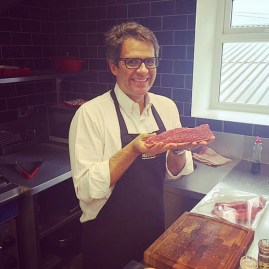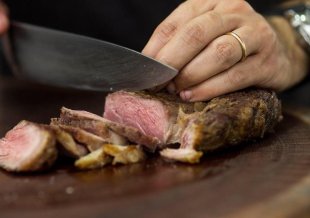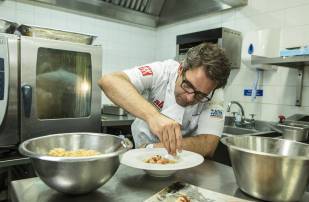As you may or may not know, Brazilians are a passionate people, and this tendency toward passion is rarely on clearer display than when a Brazilian chef talks about meat. But when you talk to Chef André Lima de Luca, you realize something a bit unusual after a few minutes: he is not passionate about the traditional churrasco-style meats, like fraldinha, picanha, or the sausages you might get at a Brazilian steakhouse. Or rather, he is not only passionate about those traditional Brazilian meats.

I sat down to talk with André Luca de Lima at my desk where I always sit. He sat down in his country house about an hour outside Sao Paolo, Brazil. Or maybe he was walking around or perhaps actively cooking, I don’t know, we decided to stick to the phone instead of using Skype for a video chat. Which is a shame, because I was wearing a very clean shirt. Anyway, if you want to know a bit about this disarmingly friendly man and to learn a bit about grilling great meat, here are the highlights of our conversation…
Steven John: At what age did you first start cooking?
André Luca de Lima: Well I am 42 years now, but I started to cook really when I was 4 years old. When I was home with my grandmother, with my family, as soon as I was old enough, 4 years, I was helping cook. When I was 18 years, I started working in the financial market, because, of course, I needed to find a job to pay my way through school, to have my own life, my independence. But then I stayed there, I did finance, until I was 35 or so.
What changed in your mid-3os?
Well what happened is… see people always aksed me “Why don’t you open a restaurant? The passion, the ability you have for food, why don’t you do this?” and I was always cooking, but never ready for doing that, and then one thing changed my life: my wife had cancer. She had a massive surgery, and it worked, and then she had to recover. I wanted to be gome with Eleonora [my wife] all the time, I told my partners I needed to do this, so I spent 3 months at home wirth her, and I started thiunking about life, about how fast it goes, I had to be happy to do what was natual for me. I always had ideas about food, about restaurants, and two partners of mine and I had a plan to open the first American BBQ house in Sao Paolo. We would be the first real BBQ in US style in all of Brazil, cooking meat with smoke, doing very slow cooking.
Where did the idea for an American BBQ restaurant come from?

And did it all work out?
Yes, yes very well. We opened the restaurant and it was a success. We ran it for three years and some, and then we did decide to close it, not because it was not working. Really I had decided I want to teach other people the same things I knew, I had learned. I wrote a book about how I cook, which is so much of it with fire. I wrote my book, All Fire, which is going to have English language version soon, and I traveled all around, in Europe, England, in U.S.
What is unique or specific to the way you approach cooking meats?
I really do use fire almost for everything. Wood fired kitchen. The grill, the stove, the oven, all of it. The heat and the smoke is so important. And patience! Slow, slow cooking. I want meat tasting so — see I don’t care so much as other chefs about the outside of the meat, how it looks. You never see me cooking with flame touching meat, I need to take it slow, make sure is evenly cooked. If I grill a two-finger steak? I put it 20 centimeters, maybe more above the grill, the coals. A thick steak, maybe 40, even 50 centimeters above. Hot coals and flame, but meat far above, cooking slow. That’s my best way.
What are most amateur/home chefs doing wrong?

What is your favorite food to prepare? And/or to eat?
Prepare… well, grilled meat, yes. A huge prime rib with peat smoke, a brisket, sure. For eating, I do love meat, but maybe from my Italian side, I would say tomato sauce and pasta. A slow, very slow cooked pasta sauce, you cook it for hours on a Sunday, maybe, and then eat it for dinner with pasta? My kids and I, we cook together, my family, like I used to. All day maybe we’ll be cooking, and then dinner time, it’s just like old fashioned traditions, no phones at the table, no tech, we just sit, we eat, we talk. Even lots of the pans, the tools in my kitchen at home are the same from when I was young, so this is a time that can connect lots of things.
How has the culinary world changed in your view?




